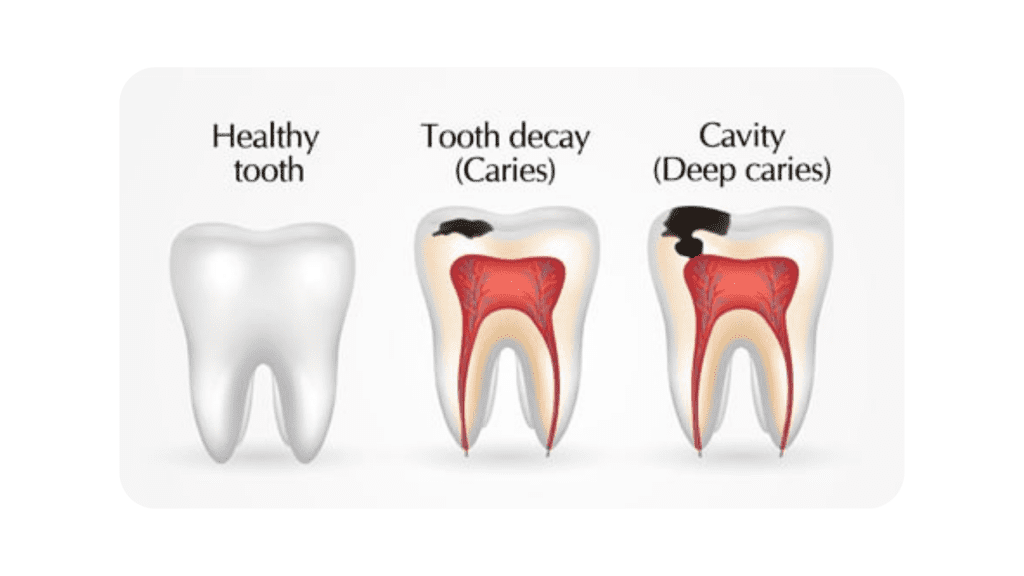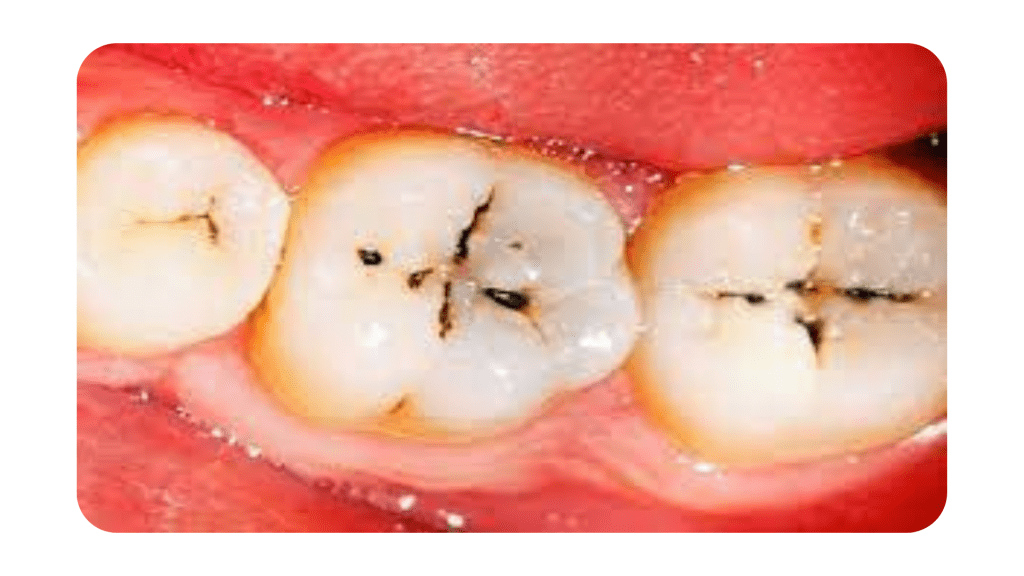

The rate at which our patients accumulate decay, also known as cavities, is something that all dentists face as a challenge that is difficult to overcome. When it comes to the state of your oral health, it is most likely one of your greatest concerns as well. Going to the dentist and being told that you have a cavity has got to be one of the most dreaded experiences ever, right? No one! Because cavities are such a significant issue that can have an impact on your entire health and wellness, I thought it would be helpful to discuss some things that you can do to assist in preventing cavities and any other type of tooth decay from developing. I don't care if you find some of these pointers to be common sense; but, I do want you to realize that the information presented here is accurate. Therefore, if you desire teeth that are healthy and free from cavities, you should make sure to apply the advice from this blog post into your daily life.

Allow me to begin by explaining the process of cavity formation, in the event that you are unfamiliar with it. An oral cavity develops when an acidic environment (pH level of 5.5 or below) is generated in the mouth, and bacteria then begin to eat away at the enamel that covers the teeth of the affected individual. If the cavity is not treated, it can result in more significant dental problems as well as health problems; thus, I want to assist you in preventing cavities before they even begin to develop in your teeth.
Now that we have everything out of the way, let's go over these 6 steps one by one!
The first step that you need to do is to ensure that you clean your teeth at least twice a day, and preferably after every meal. It never ceases to amaze me how many individuals only clean their teeth once a day, despite the fact that I see it so frequently. Brushing your teeth is the first thing you should do to protect yourself from acquiring cavities. Brushing your teeth twice a day should be something you do every single day, regardless of how much you have going on in your life or how little time you have available to devote to this task. It is imperative that you give the front of your teeth, the sides of your teeth, and the back of your teeth a very thorough cleaning when you practice good oral hygiene. I usually recommend saying it for at least two minutes! Check out this page if you're unsure how to wash your teeth in the most effective manner possible. Another aspect of oral hygiene that is addressed when one brushes their teeth is the tongue's thorough cleansing. Therefore, you should make certain that you are giving that a high priority as well.
Now, let me explain why this is important: This stage is frequently skipped by so many people. It is true that if you do not floss your teeth, you will not be able to clean a significant portion of the surface of your teeth! Let me paint a picture for you. When you don't floss your teeth, you essentially end up with these problems:
You eat, bacteria begin to consume the food you ate, then the bacteria release their excrement onto your teeth (yeah, I know this sounds horrible, but it's true), and the waste these bacteria create is very acidic. If you don't brush your teeth regularly, bacteria will build up, which will result in an increase in waste production, and voilà! A hole has developed! Plaque and bacteria that accumulate on your teeth will eventually harden to the point where you will no longer be able to remove it using dental floss and a toothbrush. This process can take anywhere from a few hours to a day or even a few days, depending on the person, but as you can see, it does not take very long. To have the hardened plaque, also known as calculus, removed from your teeth, you will need to make an appointment with either your dentist or hygienist. So the next time you feel like skipping this step, think about all of the bacteria that are happily munching away on the food that is stuck between your teeth, and how their waste is being excreted directly onto your teeth and gums.
It is important to floss your teeth at least once every day. If you are only going to floss once, you should do it before bed. However, if you are only going to floss twice a day, you need make sure that you do it at least twice a day.
Additionally, floss can clean beneath your gums, which your toothbrush cannot do, while your toothbrush cannot reach. Flossing maintains the health of your gums, which in turn maintains the health of your underlying bone structure, which in turn maintains the health of your teeth and ensures that they remain firmly planted in your jaw bone. Consequently, you should allot an additional minute or two to ensure that you floss your teeth.
After you have finished brushing your teeth, you should also make sure to rinse your mouth thoroughly with some kind of mouthwash. A last cleansing of your mouth can be accomplished with the help of mouthwash, which also assists in the removal of anything that may have been overlooked. In a nutshell, it helps minimize the amount of bacteria that are present in your mouth, and it also helps clean your gums and cheeks! It will only take you one minute, but it will do a great deal to assist you in warding off cavities. After you have finished brushing and flossing your teeth, you should consider using a quality mouthwash. I prefer mouthwashes that are alcohol-free and contain remineralizing agents such as fluoride or xylitol. Fluoride and xylitol are two examples of these types of ingredients.This will help in preventing cavities.
One of the most underappreciated ways to keep your mouth clean and your teeth cavity-free is to drink enough of water. If you don't have a toothbrush handy, you can always just take a few sips of water and give your mouth a quick rinse instead of brushing your teeth. It's not quite as effective as brushing your teeth, using dental floss, or rinsing your mouth with mouthwash, but it's a heck of a lot better than just letting food stay in your mouth, which can be harmful to your teeth. It is important to thoroughly clean your mouth with water after eating anything, whether it be a meal or something else entirely, and to remove as much food and debris from your teeth as possible.

It is imperative that you maintain consistent dental care by going to the dentist on a regular basis to avoid getting cavities. Typically, once a year for an exam and some check-up X-rays (although everyone is different, so talk to your dentist about this), and anywhere from two to four times a year for cleanings (depending on what your dentist or hygienist prescribe). I am aware that finding the correct dentist for you or simply determining how frequently you should go to the dentist can be a challenge; yet, going to the dentist on a regular basis is essential. If you go to the dentist on a regular basis, you will either be able to prevent problems from occurring in the first place or, if you have already experienced the beginning stages of some problems, you will be able to prevent them from worsening to an unacceptable degree. It is the most effective approach to stop cavities from developing in the first place or from getting worse. If you haven't been to the dentist in a while, now is the perfect time to schedule an appointment with them.
As a final piece of advice, I want to encourage you to make every effort possible to reduce the amount of sugar you consume (click here to watch my video on how you can cut sugar out of your diet). I am aware that putting this into practice is not always as simple as it sounds. Sugar, on the other hand, is one of the primary culprits in the development of cavities and other dental problems that result from it. Consider the quantity of sugar that you add to the foods that you eat, the snacks that you consume, and even the coffee that you consume. The issue is that there are a lot of hidden sugars, and as a result, there are instances when you are not even aware that you are consuming it! You may find out more about some of those sneaky sugars if you watch the video that I linked to in this blog post. Therefore, if you want to reduce the likelihood of developing cavities, you should reduce the amount of sugar that you put into your body on a daily basis.
I really hope that these have gotten you thinking about the many various things that you can do to lower the possibility of acquiring cavities in your teeth. In point of fact, it is not quite as difficult as it may seem. I have no doubt that you are aware of the bulk of these things, but it never hurts to have a gentle nudge in the right direction every now and again.
CLICK HERE TO SCHEDULE YOUR APPOINTMENT!
GET TO KNOW YOUR BEST DENTIST IN SUMMERLIN
Dr. Marianne Cohan was voted The Best Dentist/ Dental Office and Best Cosmetic Dentist from The Las Vegas Review-Journal in 2020 and 2021. She received her Doctor of Dental Surgery (DDS) from the State University of New York at Buffalo in 1992.

With an emphasis on cosmetic dentistry, complete makeovers, and implant dentistry, Dr. Cohan is committed to continuing education and feels that we never stop learning. Dr. Cohan takes pride in using high-powered magnification to perform minimally invasive restorative dentistry. She uses all the latest technological advances including digital radiography, digital photography, computer simulations, and high-resolution pictures of your proposed treatment on 55-inch screens. She also utilizes CBCT (cone beam) and laser technology.
Dr. Cohan is always available to her patients and is available for any dental emergency.
CLICK HERE TO SCHEDULE YOUR APPOINTMENT!

It's natural to be concerned or anxious about getting cavities repaired in your tooth.
It is possible for fillings to cause discomfort in some patients. However, the majority of them only produce minimal to nonexistent pain during the process.
Take a few deep breaths and keep reading if you are avoiding going to the dentist because you are terrified of the pain that you will experience there. We will describe the process of cavity filling and let you know what to anticipate in terms of the level of pain or discomfort you may experience.
What factors influence how painful a filling procedure will be?
If you have a cavity in your tooth, your dentist will almost certainly advise you to get it filled as soon as humanly possible.
In order to alleviate the discomfort that cavities can cause and to remove the risk of a more serious infection, fillings are often performed. If the cavity is not treated, it can spread to the pulp of the tooth, which is extremely painful.
Cavities that are left untreated can result in the need for more invasive procedures, such as root canal therapy or tooth extraction.
When you get a cavity filled, your dentist will remove the decay that is already present in the tooth and then restore the tooth to its normal shape. This improves the health of your mouth and makes it feel more comfortable.
Your dentist will talk to you about what to anticipate throughout the operation, as well as the extent to which it will go. This is dependent on a number of different aspects. Here are some of the potential causes of discomfort during a filling procedure:
Decay of teeth is an ongoing process. It manifests as initially as white patches on the tooth enamel, which are brought on by minute amounts of mineral loss. Through maintaining good oral hygiene or receiving fluoride treatments, you can help put a halt to tooth decay.
On the other hand, if the enamel of the tooth continues to wear away, you can develop a cavity that needs to be filled.
Cavities that are found to be relatively little and treated at an early stage are the most straightforward and expedient to treat. If your cavity isn't particularly deep, you may not feel very much discomfort at all.
It is important to bear in mind that topical numbing gel does not numb the tooth tissue; rather, it numbs only the gums themselves so that the needle does not cause any pain or discomfort while the injection is being administered.
Some individuals suffer from a fear of needles, which causes them to dread getting the injection more than any other aspect of the process. However, other individuals only dislike the numb feeling that continues to exist in the face and tongue after a cavity has been filled.
A local application of numbing gel may be all that is necessary to fully remove any discomfort felt in the gums in certain cases. In any other case, your dentist will be able to halt the drilling and give you an injection of anesthetic if you start to feel any pain during the procedure.
Cavities that are deeper necessitate the removal of further deterioration and require more time to fill. In addition, deep cavities are located closer to the tooth's nerve ends than shallower cavities. During the process, these particular kinds of cavities have the potential to produce a greater amount of discomfort.
If you don't have a particularly high threshold for discomfort, your dentist may probably suggest getting an injection of anesthesia before working on deep cavities.
Where the cavity is located on the tooth
There are three different kinds of cavities, namely:
When detected in their early stages, the vast majority of root cavities can be treated with relative ease. Small root cavities can typically be simply filled with local anesthesia.
Because the cementum at the base of the tooth is a softer substance, it can decay considerably more rapidly than the rest of the tooth. Roots that are exposed as a result of receding gums are also susceptible to decay due to the fact that roots are not as durable as enamel.
Periodontal disease, often known as gum disease, is the cause of these types of cavities almost all of the time. The gums pull away from the teeth as a result of periodontal disease, exposing the sensitive root surface of the tooth.
The total amount of cavities
If you have multiple cavities in the same region of your mouth, your dentist may suggest treating all of them at the same time to save you time.
Because of this, the treatment could take significantly longer, which could result in increased discomfort. During the operation, you will be required to keep your mouth open for an extended amount of time, which may result in discomfort in the jaw or nausea.
It is possible that the extended process will require you to get extra anesthetic.
What kinds of numbing agents are there to choose from?
It is the purpose of numbing medications to eliminate or significantly lessen feelings of pain and discomfort.
Your dentist will provide a local anesthetic (such lidocaine, benzocaine, or epinephrine) in order to numb your tooth, gum, and jaw before performing the procedure. Because the nerves in your mouth won't be able to send any pain signals to your brain when these agents are present, you won't feel any discomfort when the dentist starts to drill into your teeth. There may be a tiny degree of discomfort that is described as a light sting, but this is simply an indication that the anesthetic is doing its job and the pain should subside shortly.
It's possible that your dentist has a personal preference for a particular brand. Talk to your dentist about the anesthetic they intend to use and the reasons they believe it will be most beneficial for you.
The following are some of the common numbing drugs that are used:
If you know or suspect that you have an allergy to any of these drugs or to any other kind dental anesthesia, be careful to let your dentist know.
If you're anxious, you might also find relief from nitrous oxide (commonly known as laughing gas), which is delivered to the patient in the form of a breathing mask that covers the nose. Nitrous oxide can be used to lessen the sensation of pain, but its primary purpose is to calm fear and anxiety.
Is there pain after a filling?
After the operation, it is possible that your tooth can feel unpleasant or sensitive for up to two days.
It is natural to feel some discomfort, and it should only last for a short time. If you are experiencing substantial discomfort or observe any swelling or pus, you should contact your dentist as soon as possible. This could be an indication that you have an infection or that you require extra treatment, such as a root canal.
Any sensitivity or mild pain may become more severe if you consume something that is either extremely hot or extremely cold. It's possible that breathing in chilly air will also make your teeth tingle or feel painful.
It's also possible that, for the next several days, your gums will feel raw or sore, particularly when you clean or floss your teeth.
Why Take Such a Risk? The use of fillings is preferable to the alternative.
If you are still nervous about getting a filling, it may assist to understand why one would get a filling in the first place if you want to reduce your anxiety about the procedure. Cavities are the reason why we need to have fillings. Cavities, also known as decaying areas in teeth, can be recognized on a tooth's surface as the appearance of very small holes. Acids released by harmful bacteria known as plaque, which adheres to your teeth and feeds on food debris that is left in your mouth after meals, are the root cause of these problems.
If cavities are not filled and allowed to progress unchecked, the decay can get so severe that it reaches the nerve within the bone, causing excruciating agony. This can happen if cavities are not filled and allowed to progress unchecked. If the cavity continues to spread and reaches the gum, it is possible that this may also cause a great deal of discomfort, and it may even lead to an infection. Ultimately, the tooth will be lost.
When cavities have progressed to this stage, the essential treatments consist of more intensive procedures such as root canals and extractions. The discomfort associated with these treatments is significantly worse than that of getting a filling. As a consequence of this, getting a filling is invariably the best alternative that comes with the fewest adverse consequences.
It is not necessary for patients to feel anxious when receiving treatment for oral health issues or having cavities filled. At Summerlin Dental Solutions, our highly trained and empathetic dental specialists are able to attend to all of your dental requirements and ensure that you leave our office with a smile. Make an appointment with one of our in-house specialists here at Summerlin Dental Solutions in Las Vegas to get a cavity filled if you believe you may have one. You may get an appointment for the same day by calling the number (702)341-9160 today.
CLICK HERE TO SCHEDULE YOUR APPOINTMENT!
GET TO KNOW YOUR BEST DENTIST IN SUMMERLIN
Dr. Marianne Cohan was voted The Best Dentist/ Dental Office and Best Cosmetic Dentist from The Las Vegas Review-Journal in 2020 and 2021. She received her Doctor of Dental Surgery (DDS) from the State University of New York at Buffalo in 1992.

With an emphasis on cosmetic dentistry, complete makeovers, and implant dentistry, Dr. Cohan is committed to continuing education and feels that we never stop learning. Dr. Cohan takes pride in using high-powered magnification to perform minimally invasive restorative dentistry. She uses all the latest technological advances including digital radiography, digital photography, computer simulations, and high-resolution pictures of your proposed treatment on 55-inch screens. She also utilizes CBCT (cone beam) and laser technology.
Dr. Cohan is always available to her patients and is available for any dental emergency.